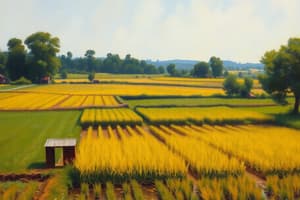Podcast
Questions and Answers
What type of crops does Munna Lal grow on his farm?
What type of crops does Munna Lal grow on his farm?
- Barley and oats
- Fruit and vegetables
- Corn and soybeans
- Wheat and rice (correct)
Munna Lal uses traditional methods of farming without any modern equipment.
Munna Lal uses traditional methods of farming without any modern equipment.
False (B)
How many hectares of farmland does Munna Lal have?
How many hectares of farmland does Munna Lal have?
1.5 hectares
Munna Lal takes advice from friends, elders, and ________ regarding farming practices.
Munna Lal takes advice from friends, elders, and ________ regarding farming practices.
Match the following individuals or entities with their roles in Munna Lal's farming:
Match the following individuals or entities with their roles in Munna Lal's farming:
What is a key characteristic of subsistence farming?
What is a key characteristic of subsistence farming?
Intensive subsistence agriculture is mainly characterized by the use of advanced machinery and technology.
Intensive subsistence agriculture is mainly characterized by the use of advanced machinery and technology.
Name one main crop grown in intensive subsistence farming.
Name one main crop grown in intensive subsistence farming.
In intensive subsistence agriculture, farmers cultivate a small plot of land using simple tools and _____ labor.
In intensive subsistence agriculture, farmers cultivate a small plot of land using simple tools and _____ labor.
Match the type of farming with its description:
Match the type of farming with its description:
Flashcards are hidden until you start studying
Study Notes
Introduction
- Agriculture is crucial for providing sufficient, safe, and nutritious food to meet dietary needs and preferences for an active and healthy life.
- Larger holdings are more suitable for commercial agriculture as in USA, Canada, and Australia.
Agriculture in India and the USA
- A small village in India, Adilabad, Uttar Pradesh, is used as a case study.
- Munna Lal, a small farmer in Adilabad has about 1.5 hectares of farmland.
- He grows two crops a year on the fertile land, usually wheat, rice, and pulses.
- Munna Lal uses high-yielding varieties of seeds, takes advice from friends, elders, and government agricultural officers, and utilizes a tractor to plough his fields.
- He also uses a tubewell for irrigation, has two buffaloes, and a few hens.
- He sells milk at a cooperative store, receives advice from the society on fodder and livestock health, and sometimes gets credit from a bank or agricultural cooperative society.
- The average size of a farm in the USA is much larger than in India, typically 250 hectares.
- Joe Horan in Iowa, USA, owns 300 hectares and grows corn after ensuring soil and water resources are suitable.
- Horan focuses on pest control using chemical pesticides and makes use of a computer linked to a satellite for precise field imaging.
- He uses tractors, seed drills, levellers, combines harvesters, and threshers for various agricultural operations.
- Farmers in the USA are often seen as businessmen, unlike peasant farmers.
Different Types of Farming
- Subsistence Farming:
- Practiced to meet the needs of the farmer's family.
- Typically utilizes low levels of technology and household labor with a small output.
- Can be further classified as intensive subsistence and primitive subsistence farming.
- Intensive Subsistence Farming:
- Farmers cultivate small plots of land using simple tools and more labor.
- More than one crop can be grown annually on the same plot due to favorable climatic conditions.
- Rice is the primary crop, with others being wheat, maize, pulses, and oilseeds.
- Prevalent in densely populated monsoon regions of South, Southeast, and East Asia.
- Commercial Farming:
- Farms are large and employ modern technology and scientific methods for efficient production of crops
- Primarily produced for profit.
- Production is done in large quantities with the aim of supplying to the market.
- Examples include cotton, grain, and livestock farming
Interesting Fact
- Organic Farming:
- Uses organic manure and natural pesticides instead of chemicals.
- Doesn't involve genetic modification to increase crop yields.
Studying That Suits You
Use AI to generate personalized quizzes and flashcards to suit your learning preferences.




